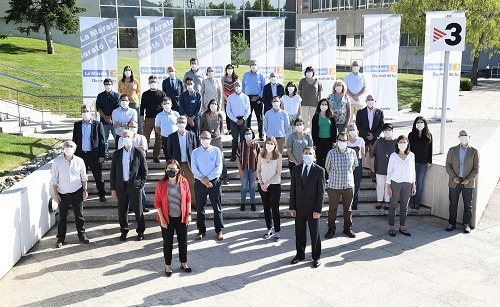
15/06/2021 - General information
This year's edition of the charitable initiative, promoted by the Catalan Media Corporation (Corporació Catalana de Mitjans Audiovisuals), raised nearly fourteen million euros to fund research into COVID-19. It was a very special edition that selected two projects led by researchers from Hospital del Mar and the Hospital del Mar Medical Research Institute, as well as a third, joint project, from among the 229 proposals submitted for funding.
The Scientific Committee of La Marató de TV3 has decided to fund three research projects on COVID-19 that involve Hospital del Mar and the Hospital del Mar Medical Research Institute. The official announcement was made on 11 June, in a special programme of Al Cotxe presented by Eloi Vila. Two of the studies are led by researchers from the IMIM and Hospital del Mar, while a third is being run jointly with other centres. This latest edition of La Marató raised almost fourteen million euros.

The successful researchers
Determining the genetic characteristics that lead to severe COVID-19
The GINA-COVID study, led by Dr. Jaume Marrugat, director of the CIBERCV Cardiovascular Epidemiology Programme and head of the REGICOR research group at the IMIM, will analyse which inflammatory and coagulation factors present in the blood lead to the most serious complications and sequelae in COVID-19 patients. "The researchers in the GINA-COVID project will look for determinants of the predisposition to suffer severe forms of COVID-19 and develop long-lasting sequelae, in the characteristics that the laws of genetics have randomly assigned to 3,400 patients who have suffered from this disease", says Dr. Marrugat.
To do this, they will use a technique for measuring genetic characteristics known as Mendelian randomisation. Of the total number of participants, one third are patients who have developed severe forms of the disease. The rest are people who have had COVID-19, but who have not required hospital admission. The genetic characteristics of their inflammatory and clotting factors will be measured and compared between the two groups to see if those that indicate an increase in these factors are also more frequent in severe cases or patients suffering sequelae. This may make it possible to develop drugs to inhibit them and etiologically treat COVID-19 complications and sequelae, as well as improve the ability to predict patient prognosis and establish vaccination and booster policies that prioritise certain risk groups.
Searching for prognostic markers in severe respiratory patients
The aim of the CoRespirOmics project is to find a way to predict the respiratory prognosis of critically ill patients with COVID-19 by means of metabolic signatures. The work is led by the Intensive Care Department at Hospital del Mar, the Critical Pathology and Metabolomics research groups at the IMIM, and is being conducted in coordination with the Institute for Bioengineering of Catalonia (IBEC) and the University of Barcelona. The principal investigator is Dr. Joan Ramon Masclans, head of the Intensive Care Medicine Service and an IMIM researcher, who explained that, "This project is based on results obtained from an earlier pilot study conducted on 49 COVID-19 patients in the first wave of the pandemic, in which a panel of 221 plasma biomarkers of different metabolic pathways, measured prior to the start of non-invasive ventilatory support, were evaluated. Ten biomarkers were key in predicting the failure of these strategies, with greater precision than the usual clinical variables."
Various metabolic patterns with specific biomarker alterations included in different metabolic pathways can predict failure of non-invasive ventilatory support therapies in patients with acute respiratory distress syndrome (ARDS) caused by COVID-19. These patterns can be associated with alterations in pulmonary mechanics in these patients and could be useful in day-to-day clinical decision-making. The study will include further samples, collected at different times after the initiation of ventilatory support, to assess the predictive ability of changes in these biomarkers. It will also include samples from two control groups suffering ARDS from different origins. The aim is to achieve a decision-making algorithm that facilitates the daily clinical care of these patients. Dr. Judith Marín-Corral, Dr. Óscar Pozo-Mendoza, and Dr. Santiago Marco-Colas are active participants in the project. The work is being run in conjunction with the Bellvitge and Joan XXIII de Reus hospitals, as well as the University of Texas, San Antonio, in the United States.
Effects of COVID-19 vaccines in transplant recipients
This study, in which Hospital del Mar is participating together with Hospital Clínic and Hospital de la Santa Creu i Sant Pau, will evaluate the safety and effectiveness of COVID-19 vaccines in patients who have had solid organ transplants. The working hypothesis is that the immune response triggered by vaccination in these people may be lower than in the general population, due to their immunosuppressed state. At the same time, it is important to understand how safe the vaccines are in these patients, who are not included in clinical trials of the vaccines.
"More research is needed on the safety of messenger RNA vaccines in solid organ transplant patients", says Dr. Marta Crespo, head of the Nephrology Service at Hospital del Mar, coordinator of the IMIM Nephropathies Research Group, and a researcher on the study. The main objective of the study is to evaluate the cellular and humoral response in this type of patient when receiving the Pfizer BioNTech or Moderna vaccines, as well as the persistence of this response over time. The safety of administering the vaccine will also be evaluated in relation to any side effects, the development of antibodies against the transplanted organ, and the possible lack of response to the vaccine. The study also involves the Pharmacy and Infectious Diseases Services at Hospital del Mar and the Catalonia Reference Laboratory.
Servei de Comunicació:
Marta Calsina Freixas(ELIMINAR)
Tel:
(+34) 93 316 06 80
Doctor Aiguader, 88
08226 Barcelona
© Institut Hospital del Mar
d'Investigacions MèdiquesLegal Notice and Privacy Policy | Cookie Policy | Site Index | Accessibility | Find Us | Contact